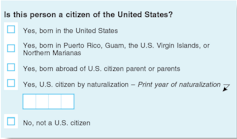Adding a citizenship question to the 2020 census would cost some states their congressional seats
- Written by Dudley Poston, Professor of Sociology, Texas A&M University
A partisan battle is brewing over the 2020 census.
In March 2018, Secretary of Commerce Wilbur Ross instructed the U.S. Census Bureau to add a new question to the 2020 questionnaire[1], asking respondents whether they were citizens of the U.S.
This decision led to a host of legal challenges. Social scientists and many U.S. Census Bureau officials fear that the citizenship question could cause some immigrants, especially undocumented immigrants, not to fill out the questionnaire, out of they fear that the information could be used to arrest or deport them. A test run in Rhode Island[2] suggests that this is likely.
The case has now reached the U.S. Supreme Court, which will decide[3] by June whether the question may be added.
A study I published on Feb. 25 with my former student, Amanda Baumle[4], now a professor of sociology at the University of Houston, found that adding the citizenship question will likely cause many million people to not respond to the census. That will reduce the official population of some states[5], leading to political and economic harm.
 The proposed citizenship question.
U.S. Census Bureau[6]
The proposed citizenship question.
U.S. Census Bureau[6]
The census is conducted every 10 years to count the U.S. population. The U.S. Census Bureau then uses these population numbers[7] to determine how the 435 seats in the U.S. House of Representatives are distributed. The number of seats that a state receives also determines the size of its delegation to the Electoral College.
In addition, a state’s total population dictates the amount of federal dollars that it receives. In 2015 alone, the federal government used census data to distribute more than US$675 billion[8] to the states. So, it’s to a state’s economic advantage to have all its residents counted in the decennial census.
In our research, we projected the population of each state in 2020, assuming that the states’ annual population growth rates from 2010 to 2017 would continue through to 2020. We then used these data to predict how the U.S. House would be apportioned.
Our work suggests that, in 2020, there should be a net change of nine seats in the U.S. House. Texas should gain three seats; Florida, two; and Arizona, Colorado, North Carolina and Oregon, one. Nine states should lose one seat: Alabama, Illinois, Michigan, Minnesota, New York, Ohio, Pennsylvania, Rhode Island and West Virginia.
However, if a question about citizenship is added in the 2020 census, that changes things. Researchers don’t know how many immigrants might not answer the questionnaire, so we looked at a number of scenarios, from only 10 percent avoiding the census, to all undocumented population doing so.
If all of the nearly 11 million undocumented immigrants residing in the U.S. do not respond and are not counted, then four states would lose a seat: Texas, Arizona, Florida and California. Meanwhile, Alabama, Minnesota, Montana and Ohio would gain one.
If 50 percent of the undocumented immigrants do not fill out the census questionnaire, then Texas, Arizona and California would lose a House seat, and Alabama, Minnesota and Montana would gain one.
A citizenship question would also carry an economic cost for some states. Let’s look at Texas, my home state. In 2015, the federal government gave Texas $40 billion. This was based on the size of the Texas population, which numbered over 27 million residents.
Texas stands to lose a great deal, if not the most of any state, if a citizenship question is added. About 1.6 million people in Texas are undocumented. If half a million or more undocumented Texans do not respond to the 2020 census, Texas will lose several billion dollars in federal funds every year starting in 2021.
Republicans generally favor the inclusion of the citizenship question on the 2020 census, while Democrats are arguing against it[9]. But ultimately, if a citizenship question is added, Texas, Arizona and maybe Florida – all states that voted for Trump in 2016[10] – stand to lose the most. In my opinion, this battle is best left unfought.
References
- ^ add a new question to the 2020 questionnaire (www.npr.org)
- ^ A test run in Rhode Island (www.npr.org)
- ^ U.S. Supreme Court, which will decide (www.cbsnews.com)
- ^ Amanda Baumle (scholar.google.com)
- ^ reduce the official population of some states (doi.org)
- ^ U.S. Census Bureau (www2.census.gov)
- ^ uses these population numbers (scholarship.law.duke.edu)
- ^ US$675 billion (www.census.gov)
- ^ arguing against it (theintercept.com)
- ^ voted for Trump in 2016 (www.nytimes.com)
Authors: Dudley Poston, Professor of Sociology, Texas A&M University

